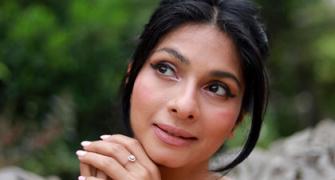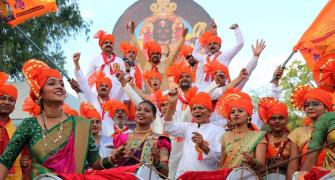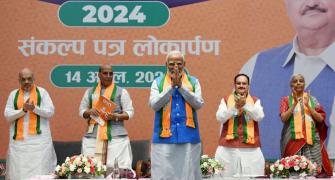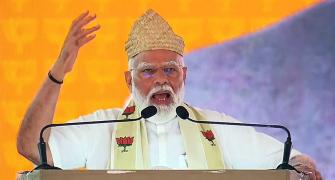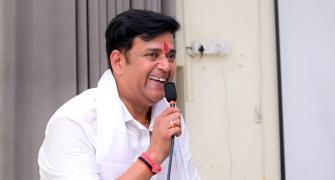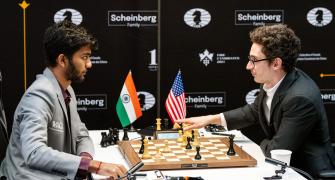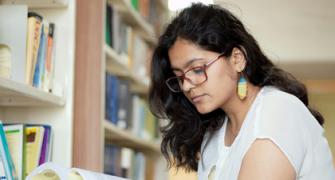The script called for a shot of the exterior of the Pakistani High Commission in New Delhi but writer, actor and filmmaker Albert Brooks, who says he had received 'unprecedented access to mosques, temples and monuments,' quickly discovered that his list did not include the embassy.
Brooks's film, now known as Looking For Comedy In The Muslim World, did not even have a title during the shoot. Or, if it did, hardly anyone knew of it. For one thing, he was afraid the title would create controversies. The film, which also stars America-raised Sheetal Sheth, revolves around a comedian (Brooks) who has to spend a month in India and Pakistan, write a 500 page report, and tell Washington what makes the over 300 million Muslims in the region laugh. But he finds people aren't opening up. He is also surprised to discover there are no comedy clubs in India or Pakistan. So, he decides to put on the first comedy concert in New Delhi. His problems continue.
Brooks, who was born Albert Einstein in an American Jewish family, realised on many occasions that despite the good will of the Indian government, there were problems he had to solve on his own -- and quickly. The Pakistani embassy officials, for instance, told him no one had ever asked permission to show the exterior of a building in a film, and that meant nobody was going to get the okay.
But then a high-ranking Pakistani government official checked into the hotel where the American production team was staying. He wanted the very suite where Brooks was. It took Brooks just a few minutes to think of barter, and it took a few minutes for the official to okay the shooting.
On another day, Brooks, who is 57, recalls in the production notes of the film, he was told he could shoot the Taj Mahal as long as tourism was not interrupted. "It was a great challenge having 800 people a foot away from your lens staring into the camera," says Brooks. "We had to keep the illusion that a movie is going on despite the onlookers." He and his crew quickly devised a strategy in which they formed a moving human daisy chain comprising their own extras who would move as the camera moved.
Producer Herb Nanas knew certain improvisation had to take place because of the unexpected happenings. "Whether it is people -- or in some extreme cases, cows, elephants or monkeys -- moving through your shot," he says, "we had to incorporate them into the scene and embrace the uniquely crowded environment."
But the problems faced in Delhi were nothing compared to what happened when he showed the film to Sony, which was to distribute it in America.
The studio thought the film -- Brooks' first in six years following The Muse which starred him and Sharon Stone -- would be controversial and suggested he take it to another distributor. The filmmaker was not amused. He felt Sony was taking an extreme step in the name of political correctness. His film was anything but provocative or derogatory of Muslims, he argued. In fact, he added, he had made the film to "tackle many of the prejudices surrounding the Muslim world."
Brooks told ABC TV he wanted to make this movie because, after September 11, he felt that Americans hated even the word 'Muslim.'
"A part of me always thought that, you know, there are a billion-and-a-half Muslim people on this planet," he continued, "and I never thought that all of them wanted us dead," he says. "So I thought, what could I do to make a movie in my style, to sort of soften this subject?"
When Warner Independent Pictures -- whose recent hits include March of the Penguins and the George Clooney-directed Good Night, Good Luck -- bought the film, Brooks must have smiled a lot. And now that the film has been accepted at the Dubai film festival that begins in mid December, he must be having a few hilarious times. A few weeks ago, he was telling Sony that when he narrated the movie's plot to the chief imam of Delhi's biggest mosque, the imam laughed a lot and blessed him. Now, he can tell the world that the Muslims in Dubai certainly have a sense of humor.
Sony, according to Brooks, had planned to have the film released in October. There were talks of promoting it for the Golden Globe (comedy or musical section) and the Oscars. Sony's biggest fear was about the word Muslim in the title.
Brooks stood his ground.
As the film is getting a lot of good publicity, its artists, especially Sheetal Sheth, are praising him for his courage and his fine sensibilities.
Sheth, 28, who has played the lead in such films as ABCD and American Chai, is getting her biggest exposure yet with Looking for Comedy. The film opens in a few cities in America late January. She says working with Brooks was a blast. "He is excellent in getting the best work from his artists," she says. But what was more important, especially for a second generation Indian American, notes Sheth, is that Brooks has a fine sensitivity towards other cultures.
"We all learned from each other everyday," she says. "It always felt like a collaboration on set. Being of Indian decent, I admire Albert so much for portraying Indian culture as it truly is in everyday life. Most people tend to only portray India as exotic. I respect him so much for caring enough to really explore the true pulse of the people as they exist today."
Brooks shot the film in about six weeks, mostly in Delhi and Agra, but he and his production team spent nearly three months looking for locations. He says in the production notes that he was "thrilled that India is one of the big stars of the movie."
Hollywood producers weary of Indian bureaucracy might want to learn a few tricks of negotiation from him.

